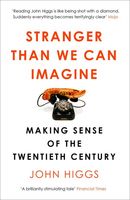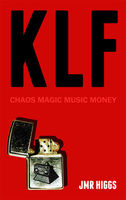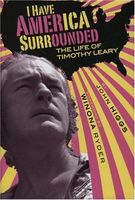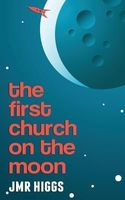A Writer's Purpose
By Koom Kankesan
John Higgs' Stranger Than We Can Imagine: Making Sense of the Twentieth Century is probably my favourite non-fiction book that I read last year. Taking an alternate route through the twentieth century (main ideas, not main events), it utilizes a system of scintillating mini-essays. I only wished that some were extended - the topics (e.g. modernism, the id, science fiction, sex, feminism, teenagers, nihilism) which organized the book were that enjoyable. It takes a great deal of effort to produce writing this engaging and charming. Ideas are connected and parsed well. Many passages make one want to pause, think, and discuss. Wit and insight are in no short order.
Besides Stranger Than We Can Imagine, John has also written a very readable cultural historical biography on Timothy Leary, a book on the KLF's burning of their last million pounds, and fiction. A Napoleon Solo conducting counterculture espionage, Higgs is a 007 with a License to Learn. He lives with his family in Brighton, England.
Koom: If I can detect a similarity that runs through your fiction and your cultural historical biography of Timothy Leary and then your unique and glorious mapping of the ideas of the 20th century (Stranger Than We Can Imagine), it's sort of a brisk wit. There's an alacrity and brightness to your writing. How does someone progress from a background in computers through the trajectory you've taken? Do you think that the role of cultural historian is the final destination?
John: The destination was always ‘writer’ rather than ‘cultural historian’, I think. The seemingly random pseudo-career beforehand was more a matter of necessity during the years as I lacked the skills, contacts, and credibility to support myself as a writer. Spending my days writing was always the goal and, although it took me long enough, I got there in the end. The trick, I eventually discovered, was to follow two golden rules: (1) Write something that people give a shit about, and (2) When that brings some money in, make it last.
The reason I’m seen as a ‘cultural historian’ is probably because the non-fiction stuff took off in a way the fiction didn’t. Also, the fiction I’ve done since The First Church on the Moon has been in the form of scripts, which have been optioned but not made and so remain invisible to the wider world. That said, I’ve just written a play which, Fates permitting, will be performed next year.
I think the challenge with every book is to escape from the box that the last book put you in. It was important that I didn’t do another strange music book after writing The KLF, for example, or else I would be forever expected to remain in that little sub-genre of my own making. My hope is that, once my readers have read a couple of my books, they’ll trust me enough to read whatever comes next, regardless of how unexpected it is. I think that’s probably the only way you can keep doing this over the long term, although I admit it could all go horribly wrong.
I like to think that all the books fit together like jigsaw pieces. They complement and inform each other, and all form a larger whole. Or at least, they do from my perspective. I appreciate that might not be immediately apparent to the newcomer!
Koom: Interesting! I like your m.o. ! I want to come back to your play in a minute but first of all, let's discuss Stranger Than You Can Imagine. I Have America Surrounded (about the life of Timothy Leary) is very readable but there is a huge jump in your writing style from that book to Stranger Than We Can Imagine. In the latter, you synthesize an incredible number of disparate references, details, and forces within each chapter. There's an arch wit to it all that manages its feat without being cocky. What happened? How did it all come about? As you say, it's a new project and a new design. But I'm interested in the nitty gritty. Was it just tons and tons of research and planning or were you powered by gusts of inspiration that just pulled together concepts intuitively?
Your CanLit News
Subscribe to Open Book’s newsletter to get local book events, literary content, writing tips, and more in your inbox
John: Yes it was all of those – you use all the tools at your disposal, and that includes crazy amounts of research and planning as well as intuitive leaps in the dark.
I Have America Surrounded is both a straight biography and also my first book, so the ambition for it was basically to pass as a solid, well researched biography. It’s like the difference between Hunter S. Thompson’s first book Hells Angels and his later work. You have to work out how to write a regular book before you can do your own thing.
The later ones are more ambitious. If you look at something like Stranger Than We Can Imagine, it’s stupidly ambitious. It’s about five different books, each of which could be off-putting to a general audience, which not only have to all work as one but also have to coalesce into a welcoming, enjoyable read. There’s a lot of work behind the scenes building something like that and trying to make it look casual and effortless. In many ways it’s not the research into the subjects included that takes the time, but all the reading around those subjects in order to feel confident about their context.
I don’t think I’ve ever really talked about this before, because I don’t want the book to be seen as an imposing, serious thing, but it seems to me that the target when starting to write any book should be, ‘will this book advance human culture?’ That sounds ridiculously pompous when you say it out loud, but the book has to sit on book shop shelves with thousands of books that do advance human culture, and it has to be able to compete with all those to justify someone spending $20 on it. It doesn’t have to advance human culture much, a tiny miniscule fraction is plenty, but it does have to try. You are expecting thousands of people to commit valuable hours of their mortal finite lives to reading your thoughts. The whole enterprise is inherently arrogant as all hell. Aiming high is the least you can do, in the circumstances.
So with Stranger Than We Can Imagine, as well as The KLF and my next book Watling Street, I research and start writing a regular non-fiction book. But I do so on a scale that allows me to arrange factual information so that a whole new story emerges from it, one not immediately obvious in all the individual parts that go to make it up. And you can’t know what that emergent narrative will be until you’ve done all the work, so you have to make a leap of faith and keep working until that bigger story emerges. Stranger Than We Can Imagine took five drafts, for example, and the overall story only started to appear on draft four. Draft five, of course, was about making it appear as if that emergent story was the plan all along.
The point of doing all those drafts is to magically generate a story that you didn’t know you were trying to tell until you told it, because that at least should be something new. If you go into a project knowing exactly what it is you want to do, and knowing that you are capable of completing it, then it probably doesn’t need to be done. It’s probably been done already. Even if you do a really good job, it’s still just a repeat and will be forgotten. Whereas, if you try to do something new and fail miserably, which is always an option, then this will also be forgotten but at least you’ll have learnt something useful for next time.
It’s very pleasing that you say the book doesn’t come across as cocky, incidentally. My first couple of drafts usually contain plenty of smug asides, but these hopefully get removed during rewrites. Which, if nothing else, is a good reason for putting the extra work in.
Koom: Hmm... now I'm starting to wonder if I readily picked up on the 'story' in Stranger Than We Can Imagine? If pressed, I'd say it's the story of how what you call our 'omphalos' or central paradigm(s) shift during the 20th century, and they shift into some bizarre and non-intuitive places.
I like that you talked about what you wish and hope for when you write a book. You're absolutely right in that we don't talk about it enough. It's uncomfortable and vulnerable and displacing to talk about our innermost and soulful ambitions. I feel similarly to you except I don't think I can fit all the projects into one grand design. I do believe in embracing an authentic and radical direction when embarking on something new though. There's the commitment you're expecting from your readers, as you mention, but there's also the sheer effort and psychological wear and tear. It's just not worth it to do something 'for hire and salary' as Hamlet says. Even if you make a tonne of money from your writing (never gonna happen in my case), the sheer effort is the principal element in the exchange. Whatever I produce has to on some intrinsic level be worth the struggle and effort and pain.
Since we're already on this topic and I've got you 'on the rocks', let me ask you how you're faring on your path? Do you now take creative direction and advance culture naturally? Or is it an effort to make it all fit together? If it's an effort, what are your mental/life tricks to orient yourself in the right direction?
John: The story of that book was how the rise of individualism in the 20th century, which many have seen as some sort of end point in the way we humans see ourselves, was nothing of the sort. Instead, it was a stopgap, interim, liminal period between the ending of the hierarchical world and the rise of the networked world. Or at least, that was the story I had in my head, which each chapter was intended to contribute to, and which determined which subjects were included in the book and which were not. Even if that story was not apparent, I hope it helped make such a wide-ranging book feel coherent. Or relatively coherent, anyway. I'd settle for relatively coherent.
As for your next question, I'm not entirely sure I know what you're asking... but I don't personally have any difficulty deciding what to do next. I usually have about five books brewing in me at any one time, which impatiently jostle to be next in queue for writing. I don't really understand the concept of 'writers block' at all. To me it sounds brilliant - you don't have anything that you need to write! Your work is done, and you can apply yourself to non-writing things! The idea that you want to write but don't have anything to write, and that's a problem, just seems odd to me.
In terms of 'taking creative direction', the decision as to which book I will do next is often a practical one, and takes on board all sort of financial and careerist notions. But the books themselves aren't generated by such sensible concerns - they all spontaneously sprout inside my head, unbidden. I've known writers who have written books that were their publisher's idea. They always turn out to be the least satisfactory books in their backlist and can disappoint the readership you are so carefully trying to build. All books have to be self-generated, I suspect, if you want your name to mean anything in the long term.
Koom: I was just asking whether you had any psychological techniques for getting back on track if you find yourself drifting off the path (of self actualization you talk of above). It seems like you don't have any trouble with this, however, as you have about five books percolating. As a way of wrapping up, I want to ask you about some of the projects you've mentioned. Let me limit it to the KLF and the new play you've mentioned. Can you tell us about them?
John: I wasn't particularly interested in The KLF at the time they were active, but when they burnt a million pounds, that act got lodged in my head. It was still there twenty years later, when it seemed like this band - who were a really big deal, they were the best selling singles band in the world in 1991 - had all but been forgotten. The problem was that I knew of no philosophy, no way of looking of the world that was capable of containing such an act as their money burning. And it was pretty evident that asking them about it wasn't going to create much enlightenment, as many people before me had asked and it was apparent that they couldn't explain why they had done it. So that is what that book is, really, it's not so much a music biography as an attempt to accept things that occur which our reality tunnels are too small to accept.
The play I'm writing is called HG Wells and The Spiders From Mars. All being well, it should be performed at some point in 2017, probably in London. I wrote it for Daisy Campbell, who directed the adaptation of Robert Anton Wilson's Cosmic Trigger, and Oliver Senton, who played Wilson in that play. It's a one man play - or rather a one visible man play, featuring Wells and a spirit who may be an Invisible Man, may be imaginary, or may be the alien sex god Ziggy Stardust who has come to earth 70 years too early and found the wrong genius in Bromley. I've written the first draft and talked it over with Daisy, at the end of which it became considerably more ambitious and strange. So I'll do another draft in January, which I may or may not be able to pull off, such is the target we are aiming for. Time will tell. It's the first thing I've written, this play, since The KLF that I've had no idea what people will make of it. Wish me luck!
Koom: I could not wish anyone more luck!
The views expressed in the Writer-in-Residence blogs are those held by the authors and do not necessarily reflect the views of Open Book.
Koom Kankesan was born in Sri Lanka. While his family lived abroad, the civil war in Sri Lanka broke out and this caused them to seek a new home. They eventually settled in Canada and have lived here since the late eighties. He has a background in English Literature and Film Studies. Koom contributed arts journalism to various publications before becoming a high school teacher in the Toronto District School Board. Since working as a teacher, he has taken semesters off now and again to work on his fiction. The Tamil Dream, his new book, is his most ambitious to date. It looks at the end of the civil war in Sri Lanka and how it affected Tamils here in Canada. Besides literature and film, Koom has deep interests in history and science, and an enduring love for comic books.
You can write to Koom throughout January at writer@open-book.ca.






